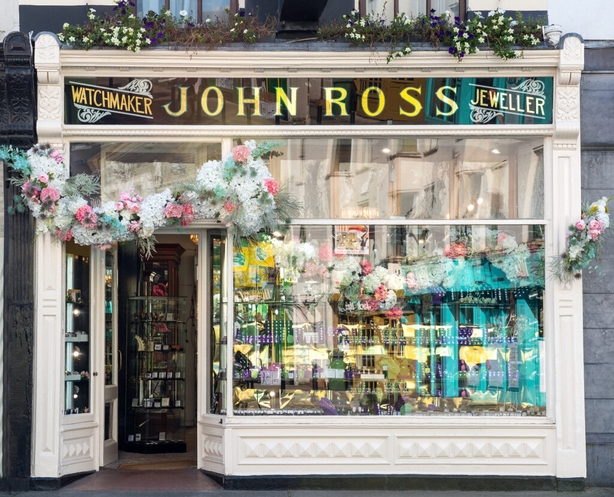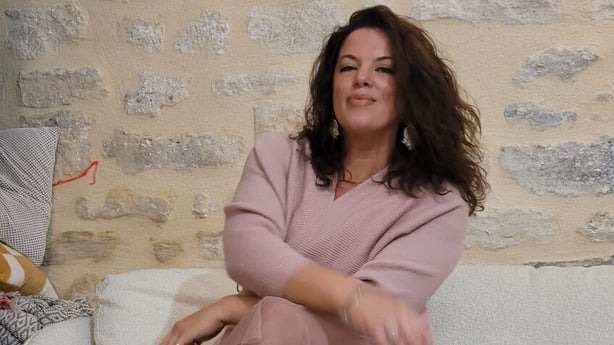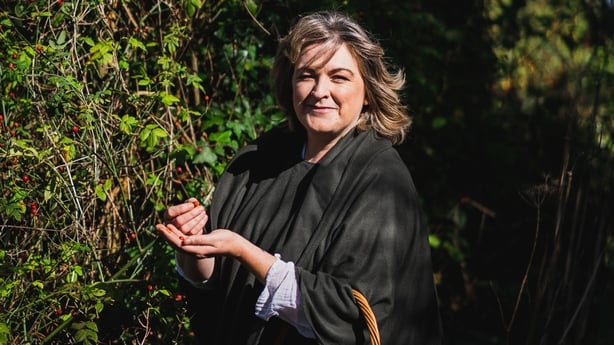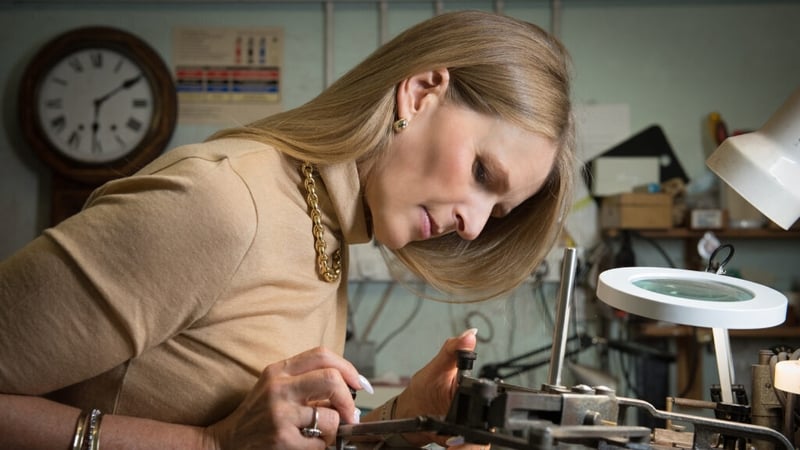Women have become vocal about what they want. And they are willing to pay for it themselves.
A jewellery shop in Kerry is seeing a huge rise in women customers, saying 90% of their customer base is now female.
“I think since Covid, there’s been a big change and a consistent rise in women customers,” said Heather O’Sullivan, co-owner of John Ross Jewellers in Tralee.
“I think we’ve all had the realiSation, Covid brought it home to seize the day and get on with your life,” she said.
Ms O’Sullivan believes women who might have been too shy to say what they wanted in the past, are now being really specific about what they want.
Instead of waiting for things, or for a partner to guess what they would like, they are going out and looking by themselves.
John Ross Jewellers was founded by Ms O’Sullivan’s great grandfather 125 years ago.
The family run business has experience of many evolving trends over the years, and more recently she has seen a rise in women buying Valentine’s gifts for themselves.
“The Palentine’s thing is taking off and they’re looking for a little bit of a treat. Why should it just be for one sector of society, the dating sector,” said Ms O’Sullivan.
Another new trend she highlighted is the rise in the “jewellery getaway”.
“It is a huge trend. We have been welcoming more and more groups of women over the past number of years, especially post Covid,” she said.
“It’s lovely to see them coming as they bring such fun. It’s such a win-win for the area as the ladies spend in other businesses while they are here”.
“Kerry is so beautiful, it has some of the best hotels in the country, some of the finest food and is super for clothes shopping too, it truly is a diamond!,” he added.

Meanwhile, the development of lab diamonds has allowed women to invest in a larger diamond for their money than a natural diamond.
Synthetic diamonds, while still worth thousands, are significantly cheaper than the price of a natural diamond of the same size and quality.
“Since the labs have come out, you can get a similar quality lab for about a tenth of the price of the real thing, a large, high quality real diamond is big money, you’re in motor car territory really,” said Ms O’Sullivan.
“That’s making a big difference for a lot of ladies because it may have always been their dream to have a large diamond. They might not be willing to spend €50,000 on a ring, but they sure as hell are willing to spend €5,000 on a ring,” she said.
While Christmas was the busiest time of year for jewellery spend last year, Valentine’s was a busy week for the sector with the busiest day being February 10, the Saturday before Valentine’s Day, according to figures from the latest AIB Spend Trend.
The average spend on jewellery in this period was €153.
In the week leading up to Valentine’s Day, Dublin (€156), Louth (€149) and Laois (€148) had the highest average transaction on jewellery while Leitrim (€91), Sligo (€100) and Donegal (€101) had the lowest.
While the data from AIB does not indicate if it was men or women who were doing the spending, Ms O’Sullivan finds it is women who are looking for a little pick me up at this time of year.
“In that post Christmas period, people are looking for something. We’re all cutting back in January trying to be good and come February you just want a little bit of a haul, something for yourself,” she said.
“I think women are very aware now of adopting the trend at the start of the trend and not waiting until everybody has it,” she explains.
“Jewellery trends tend to run throughout the entire year, unlike with clothes, so the modern trend for the current year could carry you all the way through every single season,” she noted.
While gifting yourself something might not be a romantic gesture it can tie in with having a positive relationship with yourself.
Life coach Ariana Dunne has spoken to women who chose to be single on her podcast Solo Powered.

Ms Dunne was solo by choice for most of her adult life and believes being self-partnered is great way to focus on your own wants and needs.
“I think celebrating the small wins in life by rewarding yourself in whatever way you see fit is so important,” she said.
“Solo women spend so much money on other people in the form of weddings, engagements, baby showers etc, if you can afford to buy yourself something special to make a year of being happily single then I would absolutely encourage that,” she added.
As a life coach, Ms Dunne works with clients on their own self-love and self-talk, saying the most important relationship you will ever have is the one you have with yourself.
“Now I am in a loving relationship, but I am doubtful I would have found such a wonderful partner to love had I not first fed my own heart with self-love,” said Ms Dunne.
Data from Civic Science showed that in the US last year 40% of women said they are very likely to buy themselves a Valentines gift – they identify as single, never married, while 40% are married.
Ms Dunne agrees that treating yourself can be very empowering, especially at this time of year.
“I went travelling for a year across Europe in 2022 with my dog Molly and spent Valentine’s Day that year in Paris, but rather than stay in feeling sorry for myself I got dressed up in a Carrie Bradshaw style pink dress and took myself out on a 5-course dinner date in Paris,” she said.
“I had a wonderful evening, and the chefs brought me lots of extra treats impressed that I was on a Valentines Date with myself,” she said.
“Last year I made myself heart shaped pancakes and bought myself flowers on Valentine’s Day. Solo women often feel empowered about their solo status so celebrating that on Valentine’s Day is something I would encourage more Solo Women to do.”
Scientific studies tell us that spending money triggers a rush of endorphins and dopamine.
But there is also research on how spending money on experiences can make you feel happier.
Researchers from the University of Texas concluded that people are happier with experiential purchases over material ones irrespective of when you measure happiness: before, during or after consumption.
They found that experiences also provoke more satisfaction even though people typically spend more time using their material possessions.
The researchers said a possible explanation is the endurance of experiences in people’s memories, while the perceived value of material goods weakens over time.
“If you want to be happier, it might be wise to shift some of your consumption away from material goods and a bit more toward experiences,” said lead author Amit Kumar.
“That would likely lead to greater well-being.”
Lorraine O’Dwyer, of Gallivanting.ie, says most of her customers are women, especially at this time of year.
Ms O’Dwyer is an 8th generation ‘Bean Feasa’ (traditional wise woman), who offers forging, folklore, storytelling and ferry walks in Wexford.

“I think that there’s an interest in my walks because I talk a little bit more about women’s history, women’s history in the woods, goddesses and warrior women,” said Ms O’Dwyer.
“In the last two years it’s definitely been growing, and I end up with a bunch of women coming to me for walks over the Valentine’s period,” she said,
Women are treating themselves, their friends, their mums or sisters to the experience, according to Ms O’Dwyer.
“I’m hearing them refer to it as Palentine’s and Galentine’s, or even Solo-tine’s day. But I think a lot of women like myself are calling themselves self-partnered as well,” she said.
“We’re living in a time where women are not enforced into a relationship, they’re choosing whether or not to go into relationships and a lot of women are choosing not to.”
Ms O’Dwyer describes Valentine’s Day as we know it today as a post war creation, and about consumerism, with a big push in the US to buy Valentine stuff for your children and friends.
She believes that for a lot of people in Ireland Valentine’s day, while “not quite on the slide”, is not as popular as it was.
And it could be as simple as a generational difference.
“A lot of younger people are boycotting it, my three daughters boycott Valentine’s Day, they’re anti-consumerism. They lean in towards more wholesome celebrations of themselves or wholesome activities,” she said.
“The millennial generation, unlike us Gen Xers who used to get drunk, drink champagne and go off and have a naughty night away, they’re putting a different slant on it,” she said.
“They’re going for walks, they exercise a lot more, drink an awful lot less, they’re far healthier minded. And the women I see on my walks are coming because they want to learn, to connect with the earth, and they want that ‘feel good’ that you get from being in nature,” she concluded.




